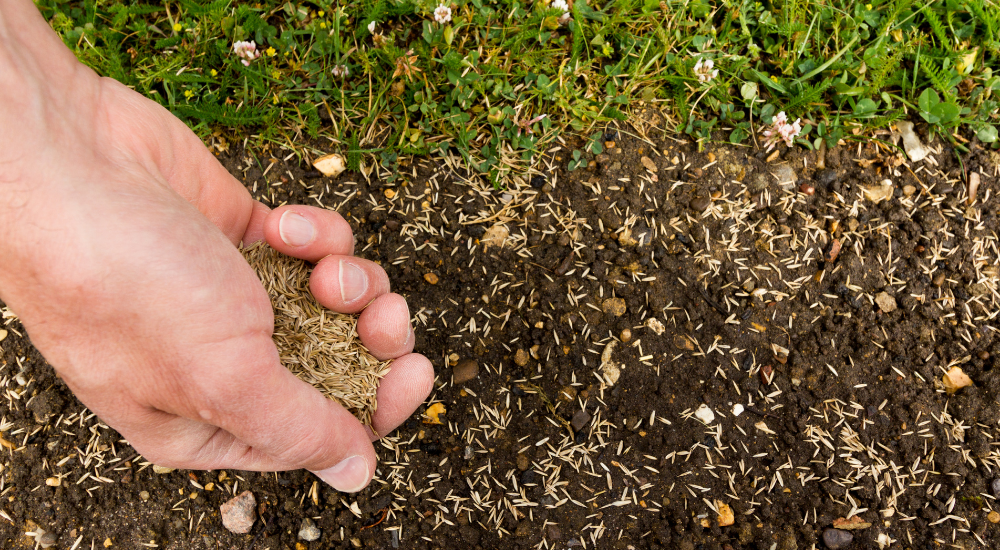How to sow a lawn

Buying turf can be expensive and sometimes you may only require new grass for a small area within your garden. Creating your lawn from seed is a cheaper alternative and can be more fun watching your grass grow. Grass seeds not only have the advantage of being cheaper, they are also more practical for difficult areas such as slopes and corners within your garden. Lawns are an essential part of your garden and for many, they are the focal point so it is key to sow your lawn correctly. This guide will take you through the steps of when and how to sow your lawn along with fantastic aftercare tips to ensure your lawn grows correctly and stays healthy.
When to Sow your Lawn
The time of year in which you sow your lawn is important, grass seeds are best sown from late summer right through to early autumn as the soil is generally warmer in these seasons; meaning you will find fewer weeds within your garden. This creates a perfect environment for your seeds to germinate. If you miss this timeframe, do not worry as you could try sowing your lawn in early Spring, however, the lawn will require more attention as it will need plenty of water. We would not recommend attempting to sow your lawn in Summer, as it is unlikely you will be able to supply the seeds with enough water without them shriveling up and eventually dying.Choosing the Right Seed
Choosing the right seed is essential, ideally you will require a seed that will create a beautiful lawn that will blend into your current garden design. At Gravelmaster we stock 2 types of seed; Grass Seed with Ryegrass and Ornamental Lawn Grass Seed, both can be used in your home garden. Ornamental Lawn Grass Seed This type of seed can be used in family gardens and will create a stunning lawn. When it has finished growing, the grass will have a moderate wear tolerance and will create a delicate, beautiful looking lawn. These seeds will also grow into a lawn that can be used on tennis courts and grass tees. It has a medium to fine texture and is ideal if you already have a path within your garden which will be walked on more frequently than the lawn itself. This type of seed is perfect for creating a beautiful focal point within your garden. Grass Seed with Ryegrass This type of seed is perfect for use in any garden. The seed contains both dwarf ryegrass and fescue creating an extremely hard wearing lawn. This is ideal if your lawn is going to receive a lot of footfall; such as Pets, sports or outdoor play, as it will still remain healthy. The seed will create an attractive, lush lawn that will complement any current garden design and is perfect if you like to spend a lot of your time in your garden.Preparing the Soil
Soil preparation is another important factor when it comes to sowing your lawn, if you get this wrong it could affect the success of your seeding and growing. You should start by removing any old grass as well as any weeds and large stones. You should then try and level the area, this is essential as you do not want your lawn to be uneven. Use a rake to level off the soil, this will also create a fine texture, perfect for your seeds to grow in. You should then begin to firm the soil by slowly walking over it, this weight will ensure the surface is level and even. At this point you could add a fertiliser to the soil to provide additional nutrients, however this is not essential. At Gravelmaster our pre seed fertiliser would be ideal. Our fertiliser is a granular fertiliser that is specifically designed for use on pre seed soil. The fertiliser is packed full of nutrients and will give the seeds a healthy start when you begin to sow your lawn.How to Sow the Seeds
We would recommend you use a prop to mark out the area in which you are going to be sowing; canes or wooden sticks are perfect. Ideally you should start by sowing in square meters, this will help when it comes to actually scattering the seeds. A good rule of thumb is to spread the seeds at around 50g per square meter. We would recommend you to weigh out the seeds you require to cover each square meter. Once you have the correct amount of seeds for each square meter measured, you should proceed to split the 50g in half. Scatter the seeds in one direction across the square and then use the other half to spread in the opposite direction. This will give you the best possible chance of an even lawn. After sowing, lightly rake over the area and sprinkle with water.Important Aftercare Tips
Aftercare after you have sowing your lawn is extremely important for the next stages. Read our 5 top tips to ensure your lawn remains plush and healthy:- In the growing stages, protect the lawn from seeds and other animals by covering the newly sown lawn with netting.
- Use canes to act as a barrier to prevent anyone from stepping on the newly sown lawn. (If someone was to step on the seeds this may affect their success and growth.)
- Don''t forget to continuously water seedlings, they are extremely vulnerable and can easily become dehydrated. Provide them with plenty of water, this is vital stage of the process.
- Whilst the seeds are still growing, we would recommend removing any weeds carefully by hand.
- When the lawn is around 6cm high you should cut it carefully with a mower to around half its height (3cm). You should repeat this process for the next 4-5 cuts.




